On today’s Front Page from The Free Press: River Page on why Twitter is real life now. Elias Wachtel falls in and out of love with Joe Biden. Madeleine Kearns on the Secret Service boss who refuses to quit. Plus: KHive, assemble!
But first, a simple question about the leader of the free world.
On Monday afternoon, Joe Biden’s doctor, Kevin O’Connor, composed a memo designed to reassure the American people. The president, who tested positive for Covid six days ago, has completed his tenth dose of Paxlovid, he wrote, and “his symptoms have almost completely resolved.” O’Connor reiterated that Biden “continues to perform all his presidential duties.”
After that letter was released, everyone here at The Free Press still had the same question: Where the hell is the president?
If Joe Biden’s decision to step down was extraordinary, so was the manner of his announcement. At this dramatic denouement of his fifty-year career in Washington, he declared the end of his reelection bid by tweeting out a letter. Since then, nothing. Or almost nothing. Late on Monday afternoon, he phoned his former campaign headquarters, now Kamala Harris HQ. “I know yesterday’s news was surprising and hard for you to hear, but it was the right thing to do,” Biden said on the call.
But we still haven’t seen the president in days.
Last Wednesday, Biden flew from Las Vegas, where he had been campaigning, to his beach house in Rehoboth, Delaware. It was there that he isolated and stewed, alongside only his immediate family and closest advisers, and reportedly came to the decision to step down. According to the White House daily schedule, the president will reemerge this afternoon and return to Washington.
Assuming that happens, the president’s disappearing act will be over, but it will have been a strange stretch in which Biden vanished at the most crucial moment.
Into the void left by the amazing disappearing president appeared all manner of theories about what is going on. Some wilder than others. Was the president faking his Covid? Did Biden even sign his own announcement? Is he much sicker than his aides and doctors are letting on? Is he even. . . alive?
For some in the legacy media, the proliferation of all these “conspiracy theories” is the real concern. The Daily Beast complained that Bill Ackman had “compared Biden to [a] ‘hostage’ in [a] conspiracy rant.” For poking fun at the missing president, Donald Trump was accused by New York magazine of having a “conspiracy-theory meltdown.”
But to me, at least, the surge in conspiracy theories isn’t as worrying as the fact we hadn’t seen the president in five whole days.
After all, if Biden isn’t well enough to face the American people, is he really well enough to “continue to perform all his presidential duties,” as his doctor claims? And with Biden isolating and Kamala booting up her own presidential campaign, who is actually running this country?
You would think a Democratic Party facing accusations of an elite subversion of the primary process would want maximum transparency right now. Instead, Biden has passed the torch in a way that seems seedier and more suspicious that it needed to.
Maybe Joe Biden knows all this. Maybe he is sulking. Maybe he is fully aware that his absence only makes his party look worse, and he’s reveling in the schadenfreude. But even after Biden pops up again, the case of the missing president will be another example of those in power complaining about a lack of public trust while finding new ways to make the problem worse.
The chances of anyone other than Kamala Harris becoming the Democratic presidential nominee went from slim to very slim Monday. The vice president continued to consolidate her support, with endorsements from more senior Democrats including Nancy Pelosi and Dick Durbin, the number two Democrat in the Senate. In her first speech since Biden’s announcement, to campaign staffers, Harris leaned into her role as an ex-prosecutor ready to take the fight to Trump. And whether it is sheer relief at the Biden waiting game finally being over or genuine optimism, Democrats are suddenly buoyant. That’s the takeaway from Olivia Reingold’s reporting for The Free Press today. She speaks to the most powerful voters in the country: the Democratic delegates who were pledged to Biden and now face the possibility of an open convention. Read her full report here.
Inside the Biden-decline scandal: Five journalists doggedly document the “epic, yearslong miscalculation that has Democrats racing to mount an uncertain reboot of their campaign against former President Donald Trump.” The reporters draw from interviews with around fifty current and former administration officials, campaign aides, donors, lawmakers, congressional aides, and foreign diplomats to describe Biden’s increasing frailty and its cover-up. (Wall Street Journal)
For 27 minutes on Sunday afternoon, it seemed that the president of the United States had resigned on X without endorsing his running mate. But then, at 2:13 p.m., came a follow-up post in which Biden announced his “full support and endorsement for Kamala.” Why the delay? Outlandish theories abound in uncertain times. Still, reports suggest that Biden hesitated to drop his reelection campaign “because he and his senior advisers worried that Vice President Kamala Harris wasn’t up to taking on Donald Trump.” (Axios)
Who will Harris pick as her running mate? One contender is Kentucky governor Andy Beshear. He was auditioning for the role on cable news Monday by taking a shot at Trump’s VP pick, who played up his Kentucky roots at the RNC last week. “J.D. Vance ain’t from here,” said Beshear. Other contenders include Transportation Secretary Pete Buttigieg, North Carolina governor Roy Cooper, Pennsylvania governor Josh Shapiro, and Arizona senator Mark Kelly. (The Hill)
For an evisceration of Kamala Harris, look no further than the latest essay by Lionel Shriver, a “double hater” who will remain a “double hater” if the VP clinches the nomination. Shriver calls Kamala “an intellectual lightweight—and I’m being polite. She cannot think on her feet. I’ve never heard her say anything original or observant; at her best, she simply recites the party line. At her worst, she’s too lazy to memorize the party line, for she has a history of not bothering to do her homework before official appearances.” (UnHerd)
A presidential nominee has never dropped out this late in an election cycle. Can a replacement be secured? Republicans are eager to make the path ahead as difficult as possible for the Democrats. Some conservative groups, sensing Biden’s precarious position, have been planning legal challenges for months. Speaker Mike Johnson told George Stephanopoulos that “we’ll see how it plays out.” But legal experts suggest Democrats might not have too much to worry about. (Roll Call)
If the Democrats are in crisis, they have only themselves to blame. So argues Ayaan Hirsi Ali who suggests a “full-on liberal civil war” may be on its way as we head into the Democratic National Convention with only mixed support for Harris. (Restoration Bulletin)
How can Kamala maximize her chances of winning? Drop the memes and focus on things that Michigan residents over the age of 50 who have never heard of Charli XCX care about, advises Josh Barro. (Very Serious)
A lot of the things we knew were bad about Kamala Harris are still bad about Kamala Harris. We just forgot. One of them: she seems to be a bad boss. Ninety percent of the staff Harris began her vice presidential stint with have since left. (National Review)
One of Harris’s biggest weaknesses as a candidate is that she was Joe Biden’s vice president, claimed to be working with him every day, and yet stayed mum about his undeniable decline. And the history of sitting vice presidents running for the top job does not augur well. (Politico)
Okay, you may have had your fill of political news. We get it. And so here is something completely different: the strange tale of Pablo Escobar’s abandoned hippos wreaking havoc in the Colombian jungle. (Smithsonian)
Calling all Florida Free Pressers: Our first in-person book club is tomorrow in Jacksonville!
It’s the eve of our first ever live book club, and we are looking forward to meeting Free Pressers in Jacksonville, Florida. Tomorrow night, River Page will be interviewing Mikita Brottman, the author of an unputdownable true crime story about a pair of adulterous Baptists in Tallahassee who murdered a man because they feared divorce would bring down the wrath of God.
But, wrote River, in his recent essay about the book, “ ‘well-to-do Southern Baptist adulterers kill husband to spare reputation’ isn’t the whole story.” He’ll be talking about the bigger picture—God, lust, and Southern Gothic—with Mikita tomorrow, and we’d love to see you there. So come along to the scene of the crime—or, close enough, to Jacksonville’s Happy Medium Books Café—at 7 p.m. on Wednesday, July 24, and get ready to find out what happens to people who can’t forget about hell.
The conversation will be introduced by The Free Press’s Francesca Block—who, from her recent reporting, knows a thing or two about true crime and terrible divorces. Tickets are free for our subscribers—but to avoid disappointment, please reserve yours today.
→ Why hasn’t the head of the Secret Service resigned? When a 20-year-old armed with an AR-15 walks through a field, climbs a roof, and fires at least six rounds at a nearby rally stage, killing one bystander, critically injuring two others, and coming within an inch of assassinating a former president of the United States, the public has many questions. They all amount to one: How the hell could this have happened?
In search of answers, representatives in Congress from both parties grilled the head of the Secret Service, Kimberly Cheatle, under subpoena yesterday. How’d that go? Well, it was swiftly followed by a bipartisan congressional letter calling for her immediate resignation. In other words, it was bad. Claudine Gay–level bad. Here are some of the highlights (or should that be lowlights?):
Cheatle said the Secret Service would never “bring the former president out if there was a threat that had been identified.” But, as Rep. Raja Krishnamoorthi (D-IL) pointed out, “We’ve now identified three points in the twenty minutes before the shooting that the threat emerged.”
Rep. Alexandria Ocasio-Cortez (D-NY) wanted to know why, ten days after an assassination attempt, we’re still no closer to getting answers: “The idea that a report will be finalized in sixty days, let alone prior to any actionable decisions that would be made, is simply not acceptable.”
Oversight Committee chair James Comer (R-KY) asked why the Secret Service left a known vulnerability unmanned. Cheatle, who previously told ABC News that the roof was “sloped,” explained that they “prefer to have sterile rooftops.” And former presidents prefer not to be shot. It’s a tricky trade-off.
Rep. Ro Khanna (D-CA) opted for a history pop quiz. How did Stuart Knight—head of the Secret Service in 1981—respond after Reagan was shot, he asked. “He remained on duty,” Cheatle answered. Wrong! He resigned. Khanna added, “I just don’t think this is partisan. If you have an assassination attempt on a president, a former president, or a candidate, you need to resign.”
Rep. Nancy Mace (R-SC) asked Cheatle whether she would like to use her five minutes to “draft her resignation letter.” Cheatle politely declined. And when Cheatle said she didn’t know how her statement was leaked to the press ahead of the hearing, Mace replied: “You’re full of shit today.”
Rep. Tim Burchett (R-TN) dubbed Cheatle “a DEI horror story,” saying he tells the female members of his family to succeed through achievement. Jasmine Crockett (D-TX), meanwhile, suggested that maybe the shooter wasn’t deemed suspicious because he was “a young white male.”
Cheatle’s other comments included “we failed,” “I am accountable,” and surprisingly, “I think that I am the best person to lead the Secret Service at this time.” For more on the failure of the Secret Service read Michael J. Ard and Charles Goslin in Discourse.
—Madeleine Kearns
→ Does Barack Obama still run the Democratic Party? One of the things we’ve learned in the extraordinary twists that ended in Joe Biden’s announcement Sunday is the enduring power of Barack Obama. His behind-the-scenes role in recent Democratic machinations—whether via surrogates like George Clooney or by declining to endorse Kamala Harris on Sunday—is undeniable. And it explodes the myth of Obama as the chilled, checked-out friend of the super-rich, no longer in the arena. But none of this will be any surprise to David Samuels, a friend of The Free Press and the co-editor with Walter Kirn of the new print-only publication County Highway. David’s brilliant pieces on Obama—and his carefully constructed public persona—make for especially interesting reading in light of the recent drama. Start with David on Obama the invisible man in 2008. Then read this 2012 profile in Harper’s. Then this more recent Q&A with Obama biographer David Garrow. Finally, this piece from earlier this month for UnHerd, on Obama as the true president of America’s fifth Republic. —OW
→ Twitter is real life now: The phrase “Twitter isn’t real life” has never seemed less true. That’s not to say the average Twitter user is the average American—which is usually what people mean by that statement. It’s to say that real life now happens on Twitter. It’s the center of the country’s political universe, for better or worse. On Sunday, when Joe Biden announced he was dropping out of the presidential race, staffers working on his reelection campaign learned about his historic decision the same way as everybody else: via a letter posted to X, formerly known as Twitter.
This isn’t unprecedented. Lest we forget, in 2011, Twitter users learned, through the grapevine, of the death of Osama bin Laden approximately twenty minutes before Obama marched up to a podium and gave a televised speech announcing the elimination of the al-Qaeda leader.
Of course, the real shift came with Donald Trump. The former Twitter superuser communicated directly with the public via the site—and occasionally his own staff. He fired multiple members of his administration via tweeting, including Chris Krebs, a top cybersecurity official, and Defense Secretary Mark Esper. After being kicked off Twitter after the Capitol Riots on January 6—which he tweeted throughout—Trump has continued to release frequent and self-written proclamations via Truth Social, his own proprietary Twitter-clone site.
Despite Biden’s positioning of himself as Trump’s nemesis and promising a return to normalcy, his anticlimactic decision to post a history-changing announcement on Twitter is a Trumpian move—something previous presidents, including Obama, his former boss, wouldn’t have dreamed of doing. In the past, such an important moment would have required pomp and circumstance, TV crews, flags flying in the background. But now the line between the online and real world has become so blurred that it hardly seems worth it to step in front of a camera and address the nation. If you want to do that, why not do it online? After all, it’s likely more people will see it that way. (Of course, had he done it in person, people on Twitter probably wouldn’t be sharing memes about “Kamala hitting send tweet.”)
Soon after Biden’s announcement, his vice president and handpicked successor redesigned her Twitter banner in “brat style” after British musician Charli XCX—whose latest album is called Brat—posted her support. A more online version of “Pokemon Go to the Polls,” this may have embarrassed me as a Charli XCX fan, but as an American too young to remember much about politics before the Twitter era, it didn’t surprise me. Politicians used to avoid subculture, pantomiming union Joes and small-business owners in ads where they sit around the dinner table, bills scattered about, insisting they were just like you. But now you are online, and they are too. The distinction between the online and offline exists as a matter of degree, not fact, and it grows lighter every day. —River Page
→ Falling in and out of love with Joe Biden: On the wall of my childhood bedroom—above the twin bed which now leaves my ankles dangling over the edge—hangs a poster. It reads: “We’re Ridin’ with Biden.”
I brought it home in 2020, after a field trip to the Iowa caucus with my AP government class. We’d all loaded into a yellow school bus, and on the four-hour drive from Chicago, I heard plenty of excited talk about Pete Buttigieg and Elizabeth Warren; there were a few Yang-gangers and a lot of Bernie Bros. We were all excited to vote for the first time—but I was the only kid excited to vote for Biden. In fact, I was already making volunteer calls for the campaign.
I had grown out of my revolutionary phase fast; in 2016, my mom had driven me to practically every Bernie rally in the Midwest. I was 14, and it seemed obvious to me then that pressing problems—poverty, prison reform, healthcare access—demanded radical solutions, not moderate ones. But four years of a Trump presidency had chastened me. I realized I valued norms and institutions and process, and didn’t want them upended, whether by the right or the left.
And so when 2020 rolled around, I didn’t just “fall in line” when it came to Joe Biden, I fell in love. I found him deeply compelling, but my support was fundamentally for everything he represented. I loved Biden because he wasn’t asking me to love him. Nothing marked a stronger contrast with Trump, whom I took to be dangerous for the same reason I found him disgraceful: he cared only for himself.
It has been strange to watch a candidate I loved become the very thing he ran against.
I think back to the bare little room in the local church nursery, where I cast my first-ever vote, in March of 2020. I was only 17 years old—but I’d turn 18 before the general, so I was allowed to vote in the primary. Checking the box next to Biden’s name felt like a vote for normalcy and for liberal democracy.
But my views on Biden have soured lately. I barely recognize the Biden I have seen in the last few weeks, and not just because of his age. In post-debate interviews, he seemed bitter and resentful, disdaining anyone who would speak ill of him and attacking the media for criticizing him. It sounded almost Trumpian. It felt like a betrayal. So I was relieved by yesterday’s announcement that Biden would not seek reelection, because it would’ve felt hard to check that box again.
I don’t regret voting for Biden. Back then, his promise to be a “bridge” to the next “generation of leaders” sounded like a good one—it’s just a shame he’s only kept it unwillingly. It’ll be a shame, too, if Biden’s left it too late for that next generation to make their case to the public. Looking at the man I’ve watched in these past weeks, I don’t know what to do with the poster on my wall. —Elias Wachtel
Oliver Wiseman is a writer and editor for The Free Press. Follow him on X @ollywiseman.
To support The Free Press, become a paid subscriber today:
And if you’re enjoying The Front Page, consider forwarding it to someone else you think might like it.







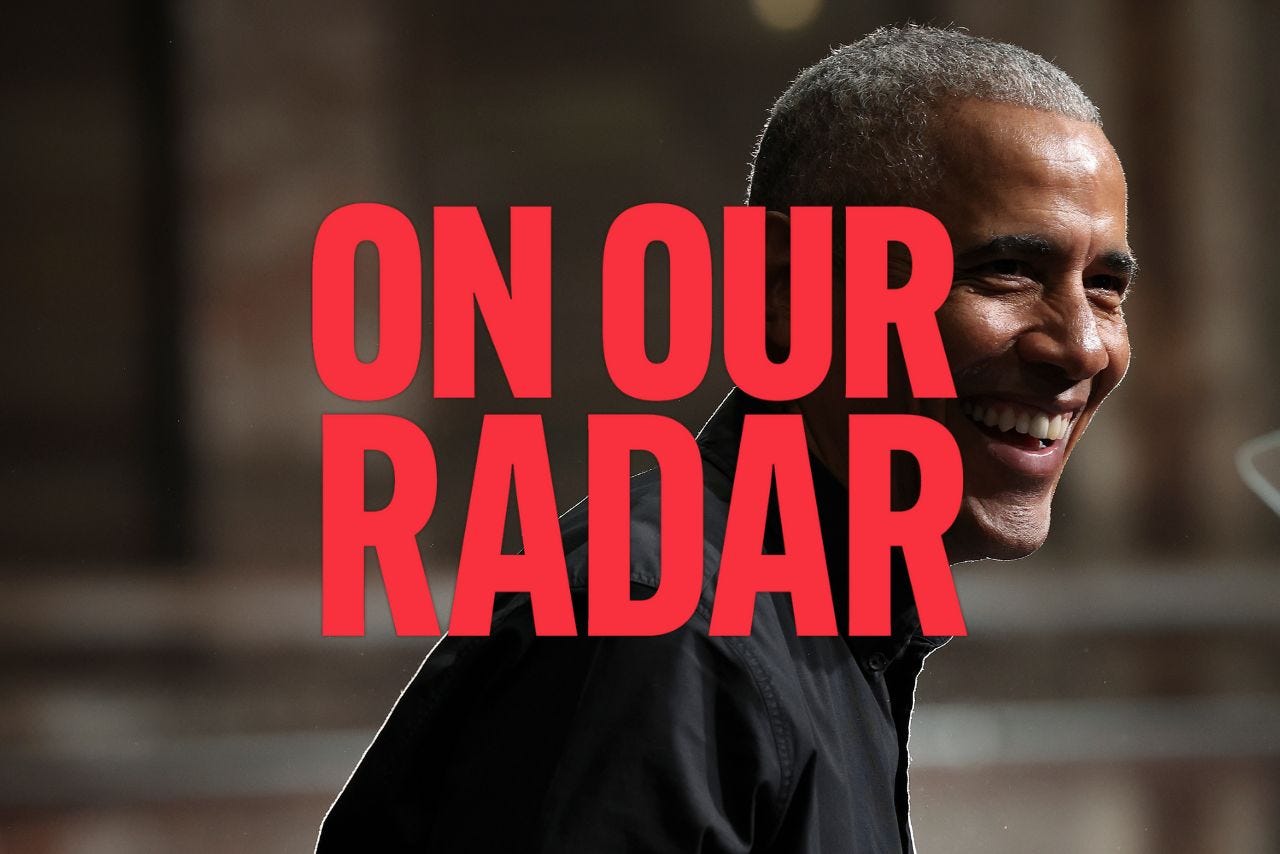



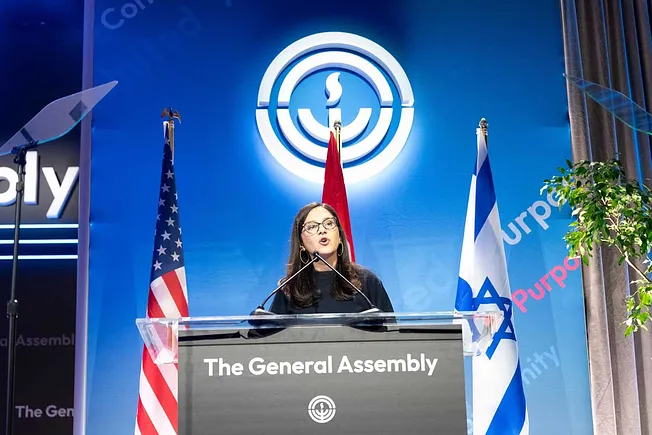
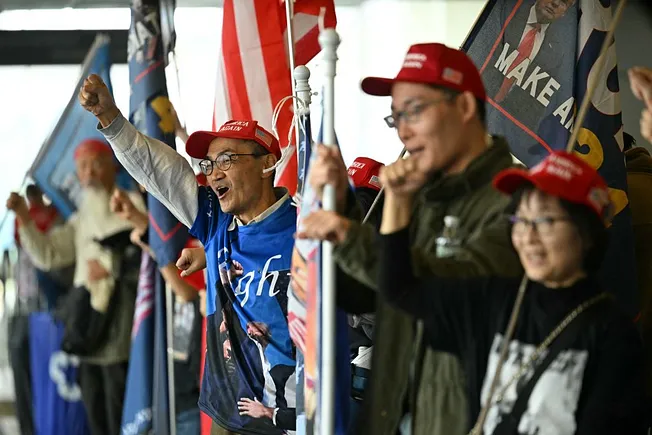
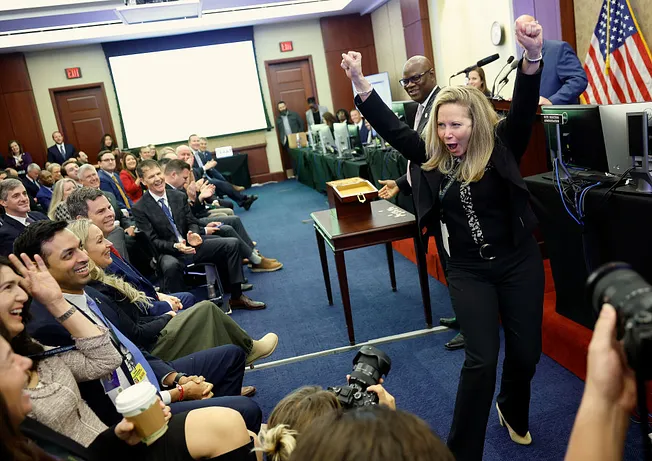
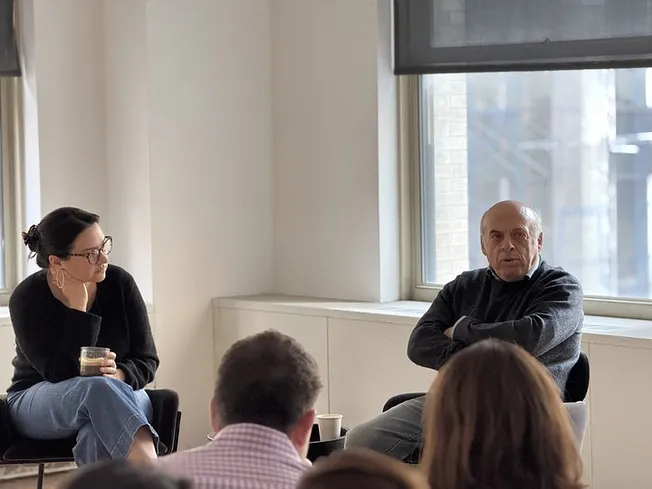
our Comments
Use common sense here: disagree, debate, but don't be a .